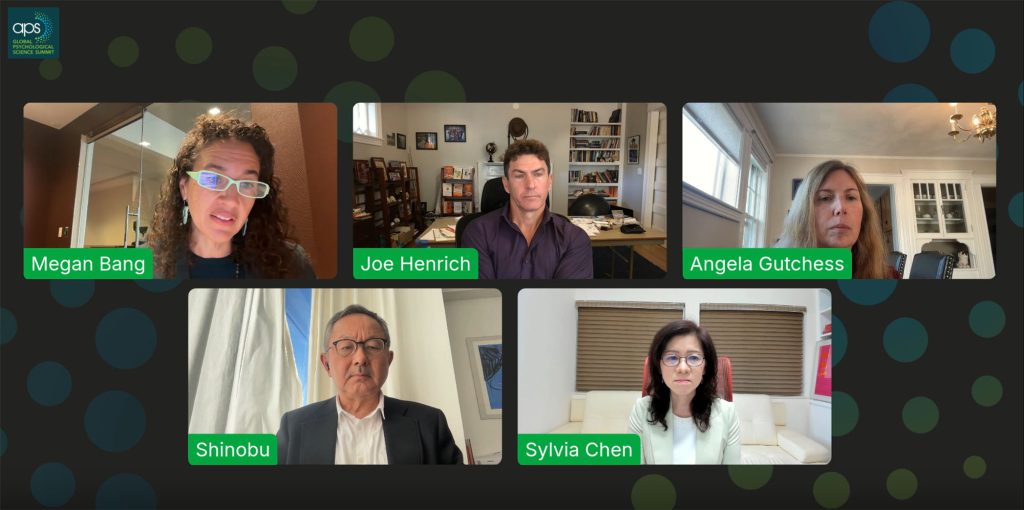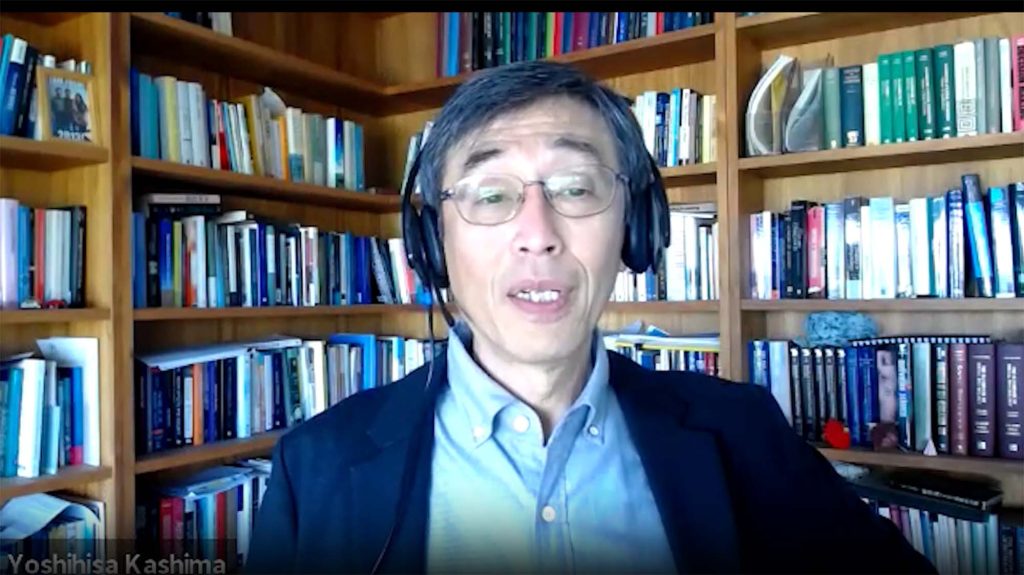Scientists Convene for Inaugural APS Global Psychological Science Summit
APS’s inaugural Global Summit paved the way for new collaborations in psychological research

Image above: Megan Bang (Northwestern University), Joseph Henrich (Harvard University), Angela Gutchess (Brandeis University), Shinobu Kitayama (University of Michigan), and Sylvia Chen (The Hong Kong Polytechnic University) held a live Q&A during the opening plenary session, “Toward a Global Psychological Science Summit,” on October 23.
Scientists from across the world gathered to share their latest research and engage in discussions on the future of global psychological science at APS’s inaugural Global Psychological Science Summit. Presenters discussed emerging issues facing global communities, such as climate change impacts, mental health support, and pathways toward more inclusive and representative research.
The summit included 468 attendees from 34 countries, with 413 presenters across two days. The virtual event, held Oct. 23-24, 2024, was designed to foster scientific exchange and collaboration among psychological scientists.

“During this two-day summit, you are experiencing exciting programming you have come to expect from APS, enjoying opportunities to meet other psychological scientists, and hearing from presenters providing deeper understanding of their research,” said Yoshihisa Kashima (University of Melbourne), co-chair of the summit’s planning committee, in a welcome address to summit attendees.
“APS is pleased that we were able to offer this important forum to our members. We are always looking for impactful ways to bring scientists together to further research and education,” said APS Chief Executive Officer Robert Gropp.
The summit began with an opening plenary that featured four renowned speakers and their visions for how to move toward a psychological science that responsibly represents global perspectives. Among the plenary speakers were APS Past President Shinobu Kitayama (University of Michigan), Sylvia Chen (The Hong Kong Polytechnic University), Joseph Henrich (Harvard University), and Megan Bang (Northwestern University).
Kitayama kicked off the event with a discussion of how the concept of the self differs across cultures. For example, he described how behaviors that promote self-enhancement could be intended to show an individual’s worth and independence or they could show one’s resourcefulness to an ingroup, depending on the society one is situated within. Kitayama and all of the opening plenary speakers tied their research back to what’s needed to support the future of global psychological science.
See all of Shinobu Kitayama’s presidential columns.
“I am optimistic about the future of psychological science as we continue to globalize the discipline,” Kitayama said. “I believe numerous new insights will emerge, and I would be very pleased if my discussion today serves as a small but important stepping stone toward this broader effort.”
Five workshops were hosted throughout the event. Each workshop was led by a psychological researcher or team of researchers and provided detailed information about a specific topic.
Zeynep Aycan (Loughborough University) presented a workshop titled “Leadership for the Next Generation: Transforming the Culture of Power to Empowerment.” During her presentation, Aycan offered a new model for transforming the culture of power, which requires loyalty to power holders, rather than to an organization as a whole. She said that this transformation should be a top-down process.
“If a change should start from power to empowerment, I argue it should start from the mindset of the leaders themselves,” she said.
Qi Wang (Cornell University) led another workshop titled “Methods to Study Culture and Life Span Development.” In the workshop, Wang introduced a multi-level analysis to capture the influence of culture on lifespan development.
“Culture is not a static entity but is transitory and ever-changing,” Wang said.
Workshop presenters also sparked discussions around learning in Indigenous children, using computational text analysis to study culture, and strategies to engage diverse students in psychological science.
“Together, these workshops reflect our commitment to fostering a connected, evolving global research community that values cultural insights, inclusivity, forward-thinking methodologies, and innovation,” said Özge Fischer-Baum, director of Scientific and Public Affairs for APS.
Related content: Check out this Under the Cortex episode on global actions for environmental stewardship.
One of the more unique elements of the summit was the inclusion of roundtables—virtual spaces where just over a dozen participants could interact with presenters on their research. Presenters provided a brief summary of their research topics and then engaged their audiences in discussion.
Linda Kim and Adam Brown, for instance, hosted a roundtable titled “Building Capacity for Care: Leveraging Global Mental Health Strategies to Support Student Mental Health in Higher Education.” Brown discussed how psychological science can be integrated with global mental health strategies, noting that current mental health needs are far exceeding the availability of resources. APS can be a powerful tool in connecting research to policy and can help create effective community-based strategies for mental health globally, he noted.
Attendees also had the opportunity to view 325 posters on a broad range of psychological topics. A chat box next to each poster allowed viewers to ask each presenter specific questions on their research.
Mariam Motunrayo (Columbia University) presented a poster on her qualitative research focused on Nigerian women who experienced child marriage. Attendee Janus Wong (The New School) chimed in on the chat, asking, “I’m wondering how storytelling of trauma among this population might be a way to build community?”
“Storytelling can indeed be a powerful way to build community among women with shared experiences, like child marriage,” Motunrayo responded. “It offers a space for connection, validation, and mutual support, which can foster a sense of belonging.”
APS thanks the several Participating Organizations that helped build awareness for the inaugural program. These scientific organizations are the Cognitive Neuroscience Society, the Society for Personality and Social Psychology, the Psychonomic Society, the Society of Australasian Social Psychologists, and the Cognitive Science Society.
A plenary session on the future of global psychological science closed out the event. Kim-Pong Tam (The Hong Kong University of Science and Technology) led the session with his presentation on what climate change means for psychological research. For example, he presented evidence showing how political divides associated with climate change are stronger in some countries than others. Tam argued that to truly recognize the global dynamics of climate change, psychological research must expand its geographic representation.
He also presented a snapshot of findings from a 2021 study that examined psychological research articles published on climate change, which was published in the Asian Journal of Social Psychology.
“A huge majority—over 90% of the studies we analyzed—involved participants from WEIRD (Western, educated, industrialized, rich, and democratic) countries,” Tam said. “The U.S. alone accounted for slightly more than half of these studies.”
APS offers year-round opportunities to engage with the global community of psychological researchers, through the Annual Convention, webinars, podcasts, and other events. Stay tuned for more details on the next Global Psychological Science Summit in the coming months.
The 2025 APS Annual Convention is an international psychological science conference that features presentations from all areas of the field. The 2025 convention will be held in Washington, D.C. on May 22-25, 2025. The Call for Submissions is now open. The submission deadline is Dec. 11, 2024.
Related content we think you’ll enjoy
-

2025 APS Annual Convention
The 2025 meeting will take place May 22-25, 2025, in Washington, D.C., featuring plenary sessions, symposia, flash talks, submitted talks, posters, educational sessions, receptions, special events, and more.
-

Webinars & Virtual Events
Networking, peer review, online research and more! View recordings of past sessions.
-

APS Podcasts and Audio Content
Feedback on this article? Email apsobserver@psychologicalscience.org or login to comment.





APS regularly opens certain online articles for discussion on our website. Effective February 2021, you must be a logged-in APS member to post comments. By posting a comment, you agree to our Community Guidelines and the display of your profile information, including your name and affiliation. Any opinions, findings, conclusions, or recommendations present in article comments are those of the writers and do not necessarily reflect the views of APS or the article’s author. For more information, please see our Community Guidelines.
Please login with your APS account to comment.